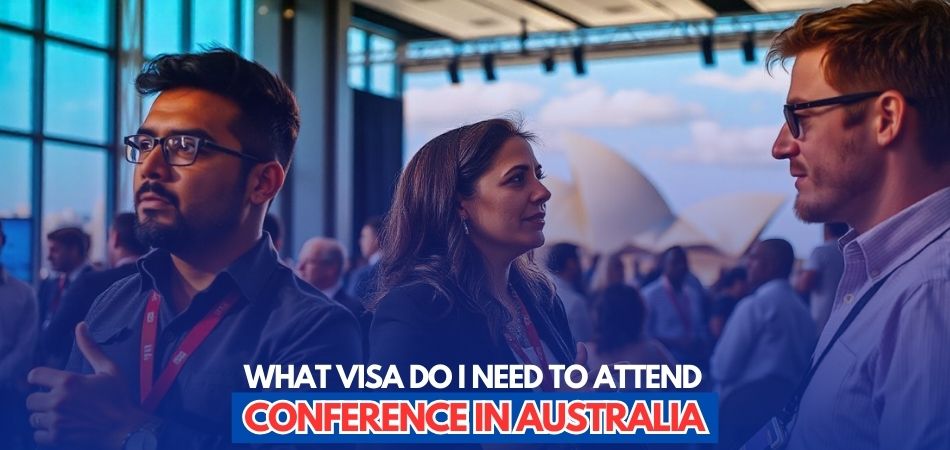Conferences in Australia attract a diverse group of professionals and researchers. These events provide platforms for sharing knowledge and networking with industry leaders. If you’re planning to attend one, you might be wondering, “What visa do I need to attend a conference in Australia?”
To attend a conference in Australia, you typically need a Visitor Visa (subclass 600) or an Electronic Travel Authority (ETA). The specific visa required depends on your nationality and the duration of your stay. Ensure that you have the correct documentation ready to support your application.
Are you curious about the details of the visa application process? This article will guide you through everything you need to know about obtaining the right visa to attend conferences in Australia.
Are Australian Conferences Important?
Attending conferences in Australia is essential for various reasons. These conferences offer a platform for professionals to exchange ideas and stay updated on industry trends. Participants can learn from experts and gain insights that can significantly improve their work. Moreover, these gatherings foster collaboration and networking opportunities, which can lead to partnerships and future projects.
In addition, Australian conferences are often rich in diverse topics that cater to different interests within economics. This variety allows attendees to customize their experience according to their professional goals. Engaging with fellow attendees enriches the learning experience, making it invaluable for personal and professional growth.
Overall, participating in Australian conferences is a strategic investment in your career. They open doors to new knowledge, relationships, and opportunities that can be beneficial in the long run.
What Visa Do I Need to Attend a Conference in Australia?
When planning to attend a conference in Australia, knowledge of the visa requirements is crucial. The most common visas for conference attendees include the Visitor Visa (subclass 600) and the Electronic Travel Authority (ETA).
Visitor Visa (Subclass 600)
The Visitor Visa (subclass 600) is designed for individuals visiting Australia for tourism or business purposes. This visa allows you to attend conferences, seminars, or workshops. It generally permits stays of up to three, six, or twelve months, depending on your circumstances.
- Eligibility: Most nationalities are eligible to apply for this visa, but it’s essential to check the specific requirements based on your country of origin. You need to demonstrate that your primary purpose is attending a conference, and you must not intend to work or study in Australia during your stay.
- Application Process: To apply for a Visitor Visa, you can do so online through the Department of Home Affairs website. Ensure you complete the application form accurately and submit all required documents.
- Processing Time: The processing time for the Visitor Visa varies, but it typically takes between 2 to 4 weeks. Apply well in advance of your conference date to avoid any last-minute issues.
- Required Documents: You will need to provide several documents, including:
- A valid passport
- Proof of conference registration or invitation
- Evidence of sufficient funds to support your stay
- Any additional documents requested by the immigration department.
Electronic Travel Authority (ETA)
The Electronic Travel Authority (ETA) is another option for visa applicants, available to citizens of certain countries. This visa allows for short visits to Australia for tourism or business, including attending conferences.
- Eligibility: The ETA is available for passport holders from specific countries, including the USA, Canada, and several European nations. Check the official website to see if your country qualifies for this visa.
- Application Process: The ETA can be applied for online or through a travel agent. The application is quick and straightforward, often taking just a few minutes.
- Validity: An ETA is usually valid for up to 12 months and allows for multiple entries into Australia. However, each stay is limited to a maximum of three months.
- Required Documents: When applying for an ETA, you will need:
- A valid passport
- A credit card for the application fee
- Basic personal information.
Additional Considerations
When applying for a visa to attend a conference in Australia, keep the following points in mind:
- Ensure Timeliness: Start the application process as early as possible to account for any potential delays.
- Check Conditions: Familiarize yourself with any specific conditions attached to your visa, such as restrictions on work or study.
- Travel Insurance: Consider purchasing travel insurance to cover any unexpected events during your trip.
In summary, determining what visa do I need to attend a conference in Australia involves considering the purpose of your visit, your nationality, and the specific requirements of the visa type. For those attending global conferences in Australia, whether opting for the Visitor Visa or the ETA, ensure you follow the guidelines closely for a seamless experience.
How to Apply for a Visa to Attend an Australian Conference
Applying for a visa to attend an Australian conference is essential for ensuring your participation. Here’s a step-by-step guide to help you through the process.
Identify the Right Visa Type
First, determine which visa you need. For attending a conference, you may require a Visitor Visa (subclass 600) or an Electronic Travel Authority (ETA). The specific visa will depend on your nationality and the length of your stay. Knowing the correct visa type will help you streamline your application process.
Visit the Official Website
Go to the Australian Department of Home Affairs website. This site has all the information about the visa application process. Make sure to read the guidelines carefully to understand what is required. This step ensures that you are well-informed before you proceed with your application.
Prepare Your Documents
Gather the necessary documents for your application. This typically includes a valid passport, conference registration confirmation, and proof of funds. Ensure that all documents are accurate and up to date to avoid delays. Having your documents organized will help the process go smoothly.
Complete the Application Form
Fill out the online visa application form accurately. Provide all required personal details and select the appropriate visa type. Double-check your information before submitting the form to avoid errors. Accuracy in this step is crucial to prevent complications with your application.
Pay the Visa Fees
After submitting your application, you will need to pay the associated visa fees. Payment methods are usually available on the application website. Keep a receipt for your records as proof of payment. Retaining this receipt is important in case you need to reference your payment later.
Wait for Processing
Visa processing times can vary, so apply well in advance of the conference. You may receive an email with your visa approval or request for more information. Stay informed about your application status during this period.
Applying for a visa to attend an Australian conference is crucial for your participation. By following these steps, you can secure the visa to attend conference in Australia successfully. Ensure you have all your documents ready and start early to avoid any issues.
How to Register for an Economics Conference in Canada?
Registering for an economics conference in Canada can be a smooth experience if you follow a clear process. Proper preparation will help you complete your registration successfully. Here are the essential steps to ensure you are ready to attend.
Identify the Conference
Start by selecting the conference you wish to attend. Research the details, including dates, location, and the themes being discussed. Make sure this conference aligns with your interests and goals. Knowing what you hope to gain from the event will help you choose the right one.
Visit the Conference Website
Once you have identified the conference, go to its official website. This site will provide all the necessary information about registration. Check for deadlines, fees, and any specific instructions for attendees. Familiarizing yourself with the website will make the registration process easier.
Fill Out the Registration Form
Locate the registration section on the conference website. Fill out the required form with your personal and professional information. Make sure to double-check the accuracy of the details provided to avoid complications later. Ensuring all information is correct will save you time and hassle.
Choose Your Registration Type
Many conferences offer different registration types, such as early bird, student, or group rates. Select the option that best suits your situation. This may also impact the total cost of your attendance. Assess your needs and budget before making a choice.
Submit Payment
After completing the registration form, you will need to make your payment. Review the total amount carefully and follow the instructions for submitting payment securely. Keep a receipt or confirmation for your records. Retaining this information is essential for any future inquiries regarding your registration.
What to Expect During the Conference?
When attending an economics conference, it’s essential to know what to expect to make the most of your experience. Here’s a brief overview of key aspects you can anticipate:
- Sessions and Workshops: Conferences typically include various sessions and workshops covering a range of topics. Attendees can participate in presentations from experts and engage in discussions. These sessions provide valuable insights into current research and trends.
- Networking Opportunities: Conferences offer excellent networking opportunities. You’ll have the chance to meet professionals, academics, and industry leaders. Building these connections can lead to future collaborations and career advancements.
- Keynote Speakers: Most conferences feature keynote speakers who are leaders in the field. Their presentations often set the tone for the conference. Listening to their insights can be inspiring and informative.
- Social Events: In addition to formal sessions, many conferences host social events. These gatherings allow for informal networking and relationship-building. Participating in these activities can better your overall experience.
- Conference Materials: Attendees usually receive conference materials, such as schedules and abstracts. These resources help you explore the conference and keep track of important sessions. Make sure to utilize these materials for a successful visit.
Can I Attend a Conference on a Tourist Visa?
Attending a conference on a tourist visa can be a common question for many. Many people wonder if they can attend a conference in Australia on a tourist visa without any issues. Being aware of the regulations and requirements surrounding this option is crucial for a smooth experience. Here’s what you need to know about this option.
Understand the Tourist Visa Rules
A tourist visa (subclass 600) allows for short visits to Australia for leisure and tourism. However, it can also cover business activities, including attending conferences. Make sure you understand the specific conditions of this visa. Being aware of these rules will help you stay compliant during your visit.
Check Eligibility for Conference Attendance
While on a tourist visa, you are generally allowed to attend conferences. However, you must not engage in work or other paid activities. It’s crucial to confirm this to avoid any visa violations. Knowing your limitations will help you enjoy the conference without any legal issues.
Confirm Conference Registration
Ensure you have registered for the conference before applying for a tourist visa. A conference invitation or confirmation can strengthen your application. This document can show your intention to participate in a legitimate event. Having this proof will increase your credibility when applying for a visa.
Prepare Required Documents
Gather the necessary documents for your tourist visa application. This includes your passport, proof of conference registration, and evidence of sufficient funds. Organizing these documents ahead of time will make the application process smoother. A well-prepared application can lead to faster approval.
Apply for the Visa
Submit your tourist visa application through the official Australian Department of Home Affairs website. Fill out the application form carefully and provide all requested information. Pay the applicable fees and keep a record of your application. Keeping track of your submission will help you monitor its progress and address any potential issues.
Frequently Asked Questions About Attending Economics Conferences
Attending economics conferences often brings up various questions. Being informed can significantly improve your experience and ensure you make the best choices. Here are some frequently asked questions along with their answers to help you participate in these events effectively.
How Do I Find Economics Conferences in Canada?
You can search online for upcoming economics conferences. Websites dedicated to academic events often list conferences by date and topic. Additionally, check with universities and professional organizations in your field.
Can I Attend a Conference If I’m Not an Academic?
Yes, many conferences welcome participants from various backgrounds. Professionals, policymakers, and students can all benefit from attending. Conferences are an opportunity for everyone interested in economics.
Do I Need to Present to Attend?
No, you don’t need to present to attend most conferences. Many attendees participate to learn and network. However, presenting can increase your experience and visibility.
What Should I Bring to the Conference?
Bring necessary materials such as business cards, a notebook, and any presentation materials if applicable. Also, prepare to take notes during sessions for later reference. Comfortable clothing and shoes are also advisable.
How Can I Prepare for Networking at the Conference?
To prepare for networking, research attendees and speakers in advance. Create a plan for whom you want to meet and set goals for your interactions. Being proactive in networking can lead to valuable connections and opportunities.
Conclusion
Attending a conference in Australia can be an exciting opportunity for personal and professional growth. Whether you’re looking to network with industry leaders or share your research, being well-prepared will improve your overall experience. Understanding the logistics, including visa requirements, is crucial for a smooth journey.
So, what visa do I need to attend a conference in Australia? Typically, you will require a Visitor Visa (subclass 600) or an Electronic Travel Authority (ETA), depending on your nationality and the length of your stay. Ensure that you check the specific visa requirements based on your country of origin and the nature of your visit.








